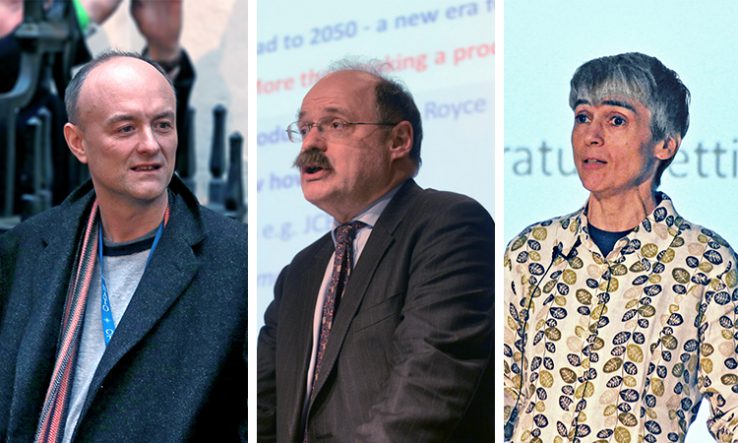
Images: Cubankite, via Shutterstock; UK in France [CC BY-ND 2.0], British Province of Carmelite [CC BY 2.0], via Flickr
Ex-adviser corresponded with UKRI leader Walport and successor Leyser on Covid, Arpa and artificial intelligence
Emails seen by Research Professional News have revealed the close ties between prime minister Boris Johnson’s controversial former adviser Dominic Cummings and the UK’s largest public research funding agency.
They reveal an offer by Cummings to speed things up at Number 10 with regards to decisions on Covid R&D if necessary, as well as UK Research and Innovation new chief’s interest in coordinating R&D on net zero greenhouse gas emissions.
Messages obtained through a freedom of information request reveal that Cummings consulted former UKRI chief executive Mark Walport and his successor Ottoline Leyser on a number of topics including plans for a new science funding agency modelled on the US Advanced Research Projects Agency.
Cummings is said to be the driving force behind plans for the funder for high-risk, high-reward, which is set to launch this year with an initial budget of £50m.
Emails dated September 2019 show that Walport was invited to a roundtable meeting to discuss proposals for the agency, including what impact it might have on UK research and development and what success might look like. The messages confirm that Walport was involved in plans for the agency amid concern about its disruption of the existing research and innovation landscape.
In another email dated 25 February 2020, Walport asked Cummings if he had had a chance to read a paper he sent him the previous week and if he would like to meet to discuss it. The title or contents of the paper are not disclosed.
Three months later on 14 May, in a message titled “AI/Covid”, Cummings tells Walport he has been re-reading his “excellent note from before Covid” regarding a deep review of artificial intelligence and asks him to send a copy.
He adds: “Also anything you need to improve speed/scale on Covid do let No 10 know…”
Although UKRI would not share the review, a spokesman for the funder said the purpose of the document was to map current UKRI support and approaches in AI research and “examine barriers and gaps in provision across the sector”.
“An external advisory group established for the review included representatives of the AI Council who used evidence from the review to inform their work on the recently published AI Council Roadmap,” the spokesperson said.
“We plan to publish a Statement of Opportunities in the near future which builds on the findings of the review and sets out opportunities we believe exist for AI research and innovation in the UK.”
Meanwhile, in a more recent email sent by Walport’s successor Leyser dated 1 September 2020, Leyser asks Cummings if it would be possible to discuss net zero at an upcoming spending review meeting.
“This is a clear policy objective that requires a cross-governmental response involving multi-sector interdisciplinary R&D,” she writes. “In order to do this well, we will need to fix many of the issues we have been discussing.”
In its response to the FOI request, UKRI said much of the correspondence was being withheld as it related to the development of UKRI and government policy “across a range of ongoing areas”.
These areas include the spending review, which took place in November 2020, Arpa, UKRI reform and preliminary discussions of other UKRI activities, evolving UKRI strategies, and information on UKRI appointments, it said. “These are all areas where a safe space is required at present.”
According to media reports, Cummings left Downing Street in November amid rumours of an internal power struggle at Number 10, which also saw communications director Lee Cain leave.
When asked about UKRI’s relationship with Number 10 since Cummings’ departure, the UKRI spokesman said the funder “continues to work closely with the government on our shared ambition to support an outstanding research and innovation system in the UK, a system that enriches lives locally, nationally and internationally”.
A version of this article also appeared in Research Fortnight